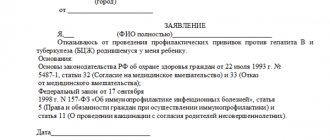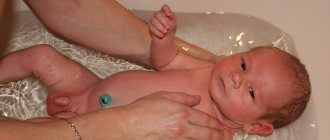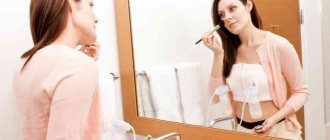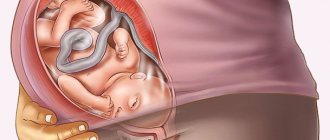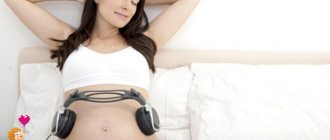It is worth preparing for childbirth in advance. Of course, it is difficult to do anything or think about anything other than the fact that the little life will soon take its first breath. The expectant mother should always be prepared for unforeseen situations. Therefore, a maternity hospital bag with everything you need is simply a must in your arsenal of things. Such bags are sold in specialized stores, for which you will only need to purchase some additional parts, and of course add the necessary documents from the hospital. If you're packing everything yourself, it's important not to forget anything.
When to pack your bag for the maternity hospital
There are no specific dates for when to pack your bags for the maternity hospital. According to doctors' advice, they should be ready by the end of the 36th week of pregnancy. But if there are good reasons to be alarmed about the occurrence of force majeure, it is worth buying the first things and packing bags for childbirth and the baby early.
Maternity institutions have a list of what the expectant mother needs to take with her. It is advisable to familiarize yourself with this information in advance. It is most rational to divide and arrange all things into four bags for the maternity hospital in packages, based on their purpose:
- for the maternity ward;
- kit for the postpartum period and recovery of the mother;
- baby care;
- for the discharge of mother and child.
Collected bags must be numbered and relatives must be informed when and which one needs to be delivered. One of the main sanitary and epidemiological requirements concerns the material of this accessory, because inexperienced women in labor sometimes take whatever they want. Meanwhile, a model made of transparent polyvinyl chloride would be an ideal option.
A cloth bag is prohibited in the maternity hospital due to the risk of spreading harmful microorganisms. Leather models are also undesirable.
Necessary medications
To increase the comfort of your stay in the maternity ward, in addition to the necessary things, documents and money, you need to take a first aid kit with you, as well as:
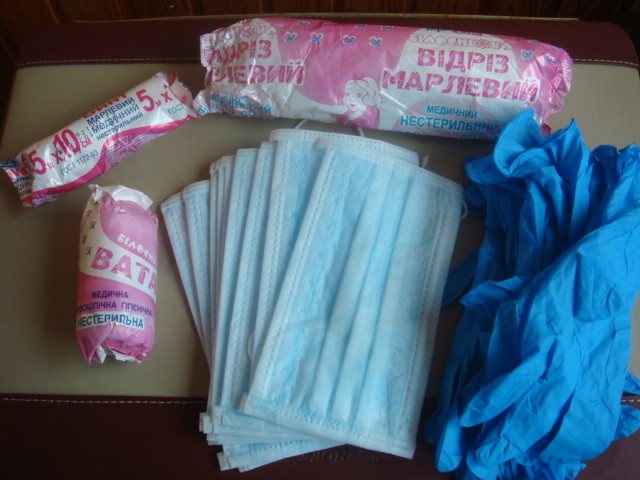
- sterile gloves – 5-7 pairs;
- non-sterile gloves – 2 pairs;
- sterile set - several pieces for relatives;
- disposable birth kit;
- urinary catheter;
- navel clip for baby;
- cotton wool and bandage;
- medical alcohol;
- syringes 5 and 10 ml – 5 pcs.;
- cotton swabs with a limiter;
- cotton pads;
- saline solution for rinsing the nose;
- aspirator for children;
- ointment for the prevention of cracked nipples;
- brilliant green for treating a child’s navel;
- glycerin suppositories;
- electronic thermometer.
There is no single set of medications for the maternity ward and postpartum ward. In order not to buy too much, it is better to consult with the maternity hospital staff. If a woman has a caesarean section, the list of required medications will be expanded.
Mandatory kits
The critical stage of childbirth and the postpartum period that follows should be as comfortable as possible for the woman and child. To collect bags for the maternity hospital, lists of things are prepared in advance. It is worth pinning a note to each package with a list of contents and those items that will need to be reported later, for example, a telephone.
To the birthplace
This is an “alarm” bag, you need to collect things for the maternity ward. The main thing is the documents, they are placed first:
- passport;
- medical policy;
- exchange card for pregnant women;
- referral or contract for childbirth;
- birth certificate;
- SNILS;
- results of the latest examinations.
A practical solution would be to purchase a PVC office folder with zippered compartments for easy document storage.
The woman in labor can also take with her money for emergency expenses, a mobile phone with a charger and headphones. A hint list of what you need to take with you to the maternity ward:
- comfortable robe;
- 2 pairs of socks;
- rubber slippers;
- cotton shirt;
- disposable razor;
- toilet seat covers;
- two packages of disposable diapers 60 x 90 cm;
- antibacterial wet wipes – 1 pack, roll of paper towels;
- three 0.5 liter bottles of drinking water - will come in handy during and after childbirth.
Many pregnant women are recommended by doctors to use anti-varicose compression stockings to reduce the risk of blood clots during childbirth. The lists may also include a couple of spare bags for packing your clothes and shoes in order to put the bags with things in storage or send them home.
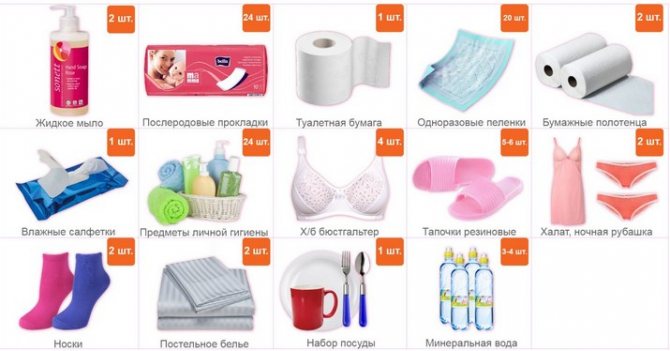
After childbirth
The stay of mother and baby in the postpartum ward is usually limited to five days. It is for this period that we collect bag “number 2”. It will be delivered by the family along with the “baggage” for the newborn.
For Mom
The list is compiled taking into account the requirements of the maternity institution. The list of what to put in your bag typically includes:
- a shirt convenient for feeding – 2 pieces;
- cotton socks – 2-3 pairs;
- bra with wide straps for nursing;
- lactation inserts for milk leakage;
- postpartum bandage corset;
- pack of 5 disposable mesh panties;
- elastic bandage;
- sanitary maxi or urological pads;
- two towels: for hands and shower;
- pen, notebook, interesting book;
- individual set of dishes, plastic bags for garbage;
- hygiene products: toothbrush, shampoo, conditioner, travel gel, antibacterial soap with dispenser;
- care items: mirror, nail scissors, cream, hair brush;
- healing cream for breasts: Bepanten, Purelan.
Before packing your bags for the maternity hospital, you should carefully review what is on the list - some things only seem necessary at first glance. And relatives can always hand over clean clothes or forgotten little things if necessary.
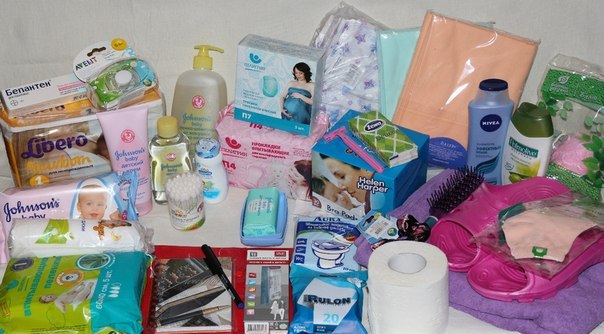
For the baby
What to take in a bag for a child to the maternity hospital is inquired in advance at the medical institution; there must be a list of permitted children's things. In the postpartum ward, the baby will need:
- breathable disposable diapers – 1 pack;
- diapers: 2 flannel, 1 knitted;
- blouses, bodysuits, vests, 2 pieces each;
- cap, cap;
- rompers, cotton “men”, 2 pieces each;
- latex pacifier;
- a set of soft small towels;
- 2 pairs of socks, anti-scratch mittens;
- children's scissors - it is better to cut off a child's long nails immediately;
- soap in a bottle with a dispenser, cream, cotton pads;
- high-quality hypoallergenic wet wipes – 2 packs;
- diaper rash cream;
- baby moisturizer, because baby's skin is prone to dryness.
Almost all maternity hospitals provide sterile diapers for newborns. But diapers and pacifiers are prohibited in some of them.
The bags collected for mother and baby contain the really necessary things. In cold weather, it's a good idea to bring a light blanket to cover your baby.

For discharge
This bag will be delivered to the maternity hospital by relatives on the eve of discharge. Collect things as in the previous case - separately for mother and child.
Take clothes for your baby according to the weather and time of year:
- diapers – 2 pieces;
- a set of thin things: a vest, rompers, a cap;
- insulated suit;
- transformable overalls or envelope, warm hat.
If you plan to return home from the maternity hospital by car, you should worry about the availability of a car seat.
When choosing an outfit for discharge, it would be correct to focus on loose-fitting clothes. The figure of the new mother has not yet recovered after childbirth and is far from ideal. You will also need:
- underwear, tights;
- outerwear, shoes - based on the time of year;
- hair dryer and hair accessories, cosmetics.
Before discharge, you must check that all issued documents are filled out correctly.
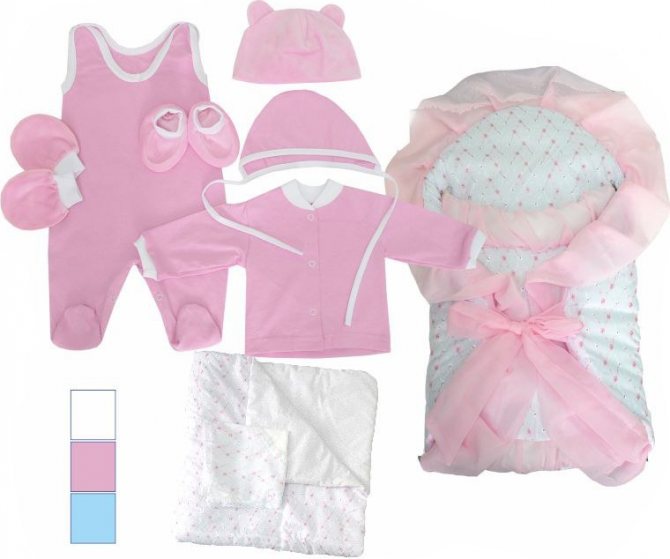
What not to take to the maternity hospital
To prevent your maternity hospital bag from becoming a weighty and voluminous suitcase, which is highly unwelcome by the staff of the medical institution, you must strictly follow the permitted list. It is generally undesirable to take food, much less perishable provisions. Breastfeeding mothers in the maternity facility are provided with dietary nutrition, and allowed fresh food will be given to relatives after childbirth. The ban applies to carbonated drinks and coffee. The same applies to citrus fruits, chocolate products, eggs, tomatoes, smoked meats - everything that can cause allergies in a child.
Typically, laptops and tablets are not welcome in maternity hospitals, as they increase the load on electrical networks when recharging. According to fire safety rules, kettles and boilers are not allowed. Sometimes you cannot use your own clothes, dressing gowns, nightgowns. To avoid the development of bacteria, the following are prohibited:
- synthetic clothing, underwear;
- fur, woolen items;
- fabric slippers.
Breast pumping is not a mandatory position, it is only needed occasionally when the separation of mother and child is practiced. A postpartum bandage is also unlikely to be useful right away. These two things should not be taken; if necessary, relatives will always give them to you.
There is no place for any perfume in your bag; it is harmful to a newborn and can cause allergies. There is no need to take medications “just in case” and “spare” children’s things. Expectant mothers need to use common sense when packing for the hospital.
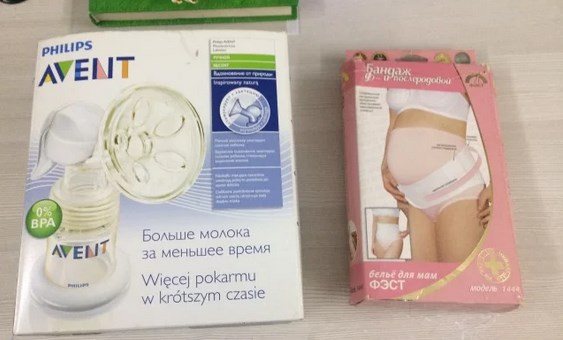
Breast pump and bandage

Foods not recommended for nursing mothers
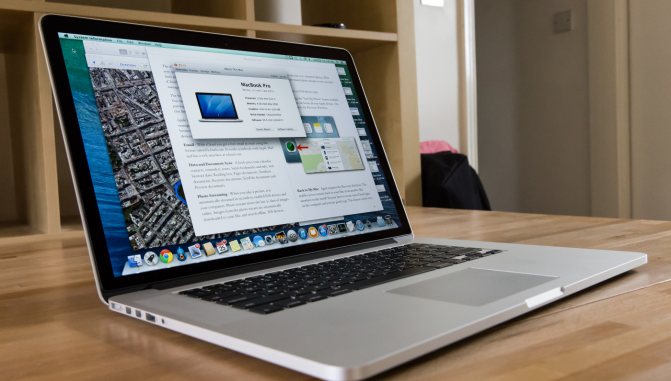
Tablets and laptops

Perfumery
Important information
Each institution has its own list of items allowed in the maternity hospital, and it is advisable to check it directly with the maternity hospital where you plan to give birth.
Since this list is open, you can start packing your bag in advance. Usually a working woman begins to slowly prepare for childbirth, including preparing her bag when she goes on maternity leave. And what week it will be, options are possible. Most often, in a singleton pregnancy this is 30 weeks.
You can, of course, hold out until the end, but the process of childbirth is not always predictable, and it is not known exactly when it will end in childbirth. Therefore, if you are not sure that your loved ones will be able to collect the necessary things, then it is better to take care of everything in advance and on your own.
Editor's choice: Privileges for a pregnant woman at work: highlights
It is advisable to start preparing with a clear separation of things. So that later you will know exactly where to grab your emergency bag if anything happens.
Below we publish a sample list of necessary things. We remind you, check the list of the specific maternity hospital!
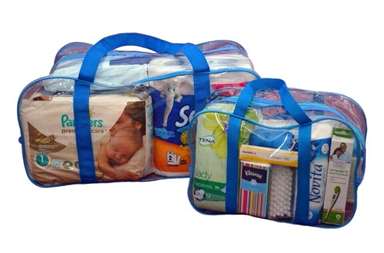
Advantages of ready-made kits
There are many specialized stores offering already assembled bags for the baby and mother in the maternity hospital. They contain ready-made kits with a sufficient number of necessary things. The composition of the bags complies with sanitary rules and requirements of the administration of maternity institutions. In the absence of time, when there is no time to look for an answer to the question of what set of things needs to be prepared, especially if it is the first birth, it is convenient to buy a ready-made option. Experienced mothers in labor recommend the “I’ll Be a Mother” maternity hospital bag: the price is affordable, the composition of the items is optimal. Of the more expensive options, the “Organic” set of the maximum configuration with newfangled products, as well as the “Comfort” bags, received good reviews. The downside of all, no matter the ready-made options, is the likelihood of the presence of unnecessary things or a lack of necessary ones, because each mother and child are still individual.
The expectant mother must decide for herself which option is more acceptable to her - a store-bought kit or a bag she assembled herself. In any case, timely and thoughtful preparations will avoid unnecessary stress.

